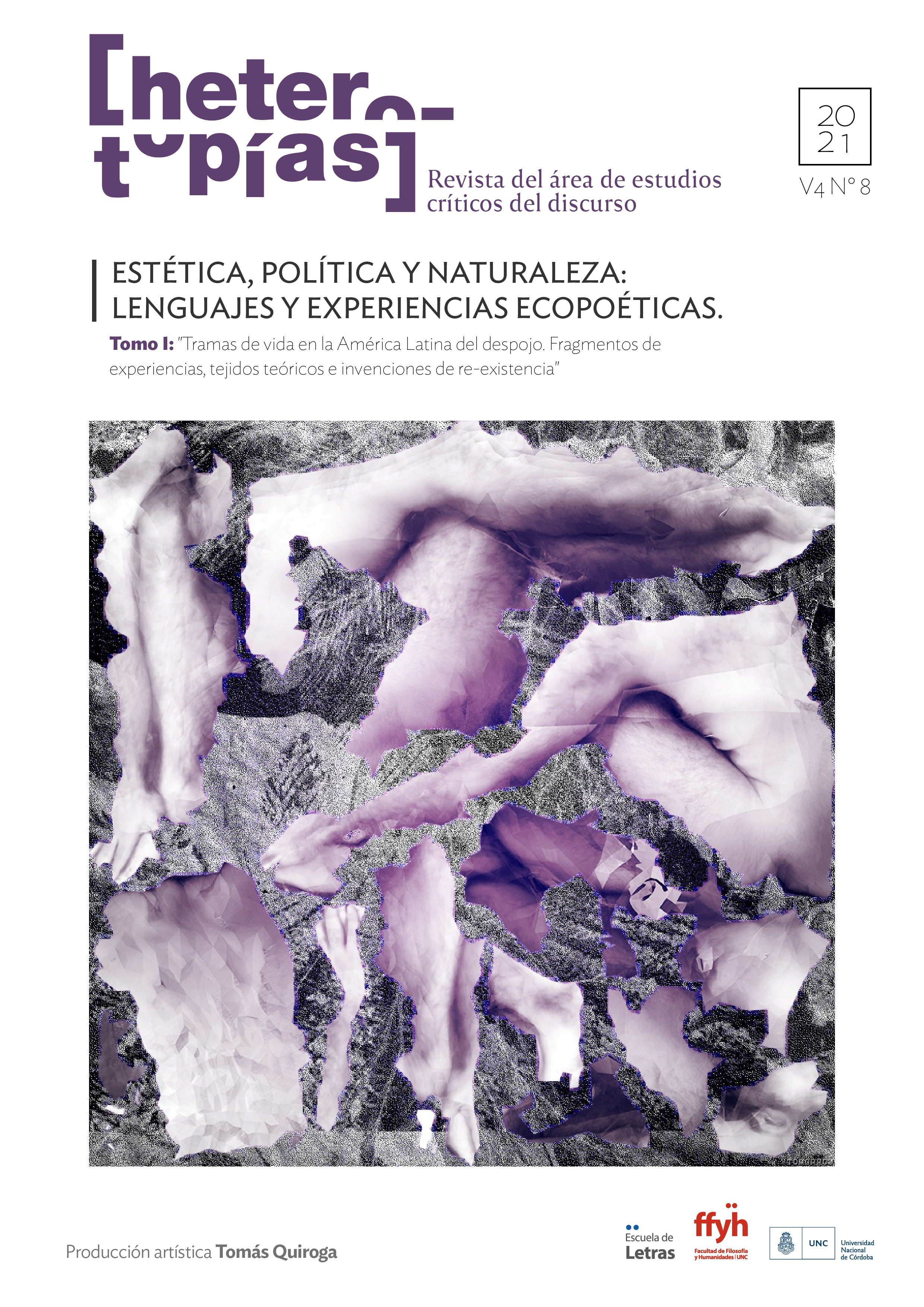Some mountain sustains us today. Geological resistances.Description of a collective experience
Main Article Content
Abstract
From a general theme that, in a first instance and provisionally, we have provisionally named as performative writing around our mountains, our work consists of playing, imagining, risking forms of writing crossed by a geology and genealogy of revolt and resistance in its defense against extractivism.
What mountains surround us, how do we name them?
Just at the moment when the belly of the hills was lost, I felt fear. Walking there was not my thing. They were not there. It didn't take me long to go back. Although to go back, I go up; I live below, next to the river that is drying up.
Plateaus, walls -it seems that the wall is the edge of the plateau-, Sierras Chicas, hills. Cordón del Plata, frontal cordillera...every time I leave home and look to the west, it embraces me, sings, whispers, moves, shouts, blows What memories, what edges and overflows, what communal bards lodge these mountains?
Where are the ancestors? The Aymara language mused hankuqawa, white tunic.
Where are the ancestors? Look at the majesty of the aCONcAGUA; with water, with water. The ancestors woke up and walked Mendoza in a hot December 2019.
The relief body of the earth, a geographical fault. Between and with these unevennesses of the ground the rains are welcome, the suns expanded, the ocher autumns loved, the frosts appeasing. The macabre fires, the sinister clearing enrages the mountains, the sierras move, the guardians of the forest are alerted, they fly over, they roar. Poetry, lair and sorcery.
How to be singularized as a fragment of a topological rockiness? Discontinuities, fragments, mineral graphies that resist and make memory in cosmological traces.
Downloads
Article Details

This work is licensed under a Creative Commons Attribution-NonCommercial-ShareAlike 4.0 International License.
Those authors who have publications with this journal, accept the following terms: Those authors who have publications with this journal, accept the following terms:
a. The authors will keep their copyright and guarantee to the journal the right of first publication of their work, which will be simultaneously subject to the Creative Commons Attribution - Non-Commercial - Share Alike (by-nc-sa) Attribution License; no commercial use of the original work or any derivative works is allowed, the distribution of which must be done with a license equal to the one that regulates the original work.
b. Authors may adopt other non-exclusive license agreements for the distribution of the published version of the work (e.g., deposit it in an institutional telematic archive or publish it in a monographic volume) provided that the initial publication in this journal is indicated.
c. Authors are allowed and recommended to disseminate their work through the Internet (e.g. in institutional telematic archives or on their website) before and during the submission process, which may lead to interesting exchanges and increase the number of citations of the published work. (See The effect of open access).
References
Bolaños, M. (2020). Geopoéticas. En Cangi, Adrián y Gonzales, Alejandra (comps.) Meditaciones sobre la tierra.2020. Red editorial. Vicente López.
Cohen, J. (2015). Stone. An ecology of the Inhuman. University of Minnesota Press. Minneapolis. Londres.
Dvořák, T y Parikka, J. (2021). Introduction: On the Scale, Quantity and Measure of Images en Photography Off the Scale technologies and theories of the Mass Image. Edinburgh University Press.
Fisher, A. (2012). Photographic Scale. En: Philosophy of Photography. Vol. 3, N. 2. Disponible en: https://www.researchgate.net/publication/274325118_Photographic_Scale.
Gudynas, E. (2009). Diez tesis urgentes sobre el extractivismo. pp 187-225, En: "Extractivismo, política y sociedad", varios autores. CAAP (Centro Andino de Acción Popular) y CLAES (Centro Latino Americano de Ecología Social). Quito, Ecuador. Noviembre 2009. ISBN 78 9978 51 024 7.
Haraway, D. (2019). Seguir con el problema. Genera parentesco en el Chthuluceno. Trad. Helen Torres. Ed. Consonni.
Haraway, D. (2021). TESTIGO_MODESTO@SEGUNDO_MILENIO .HOMBREHEMBRA©_CONOCE_ONCORATA®. Rara avis. Bs. As. Argentina.
Kohn, E. (2021). Cómo piensan los bosques. Hacia una antropología más allá de lo humano. Hekt. Bs. As.
Parikka, J. (2021). Una geología de los medios. Caja negra. CABA.
Svampa, M; Antonelli, M. (eds.) (2009). Minería transnacional, narrativas del desarrollo y resistencias sociales. Editorial Biblos. Buenos Aires.
Svampa, M. y Viale, E. (2014). Maldesarrollo. La Argentina del extractivismo y el despojo. Ed. Katz y Fundacion Rosa Luxemburgo. Argentina.
UACCH. (2019). Hablemos de megaminería. Disponible en: www.noalamina.org.
Vinciguerra, L. (2020). La semiótica de Spinoza. Cactus. CABA.
